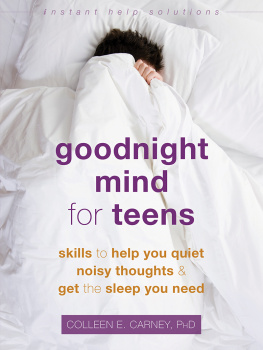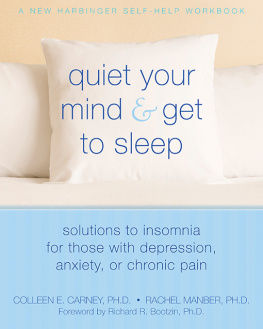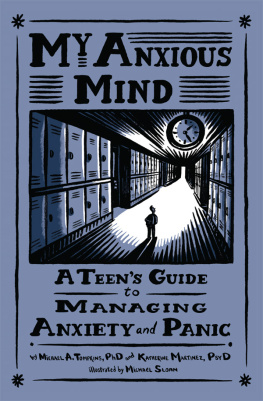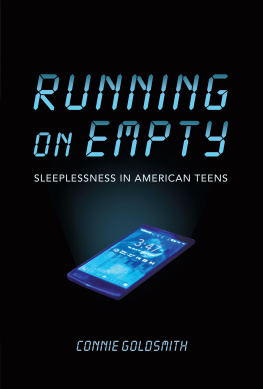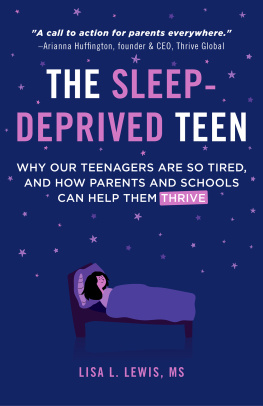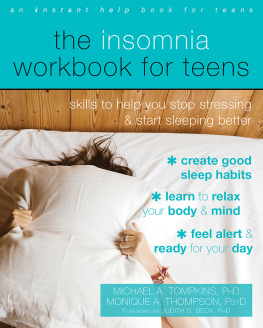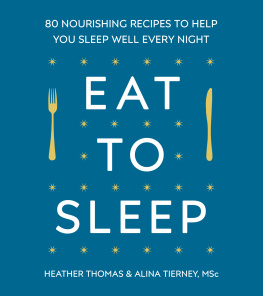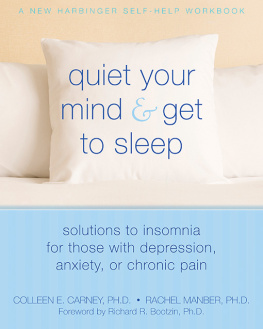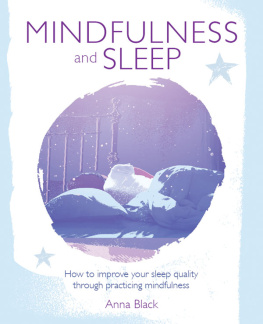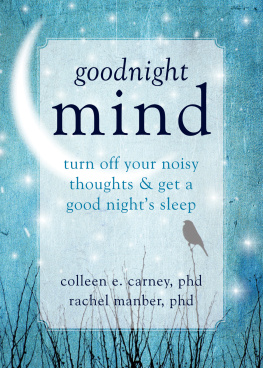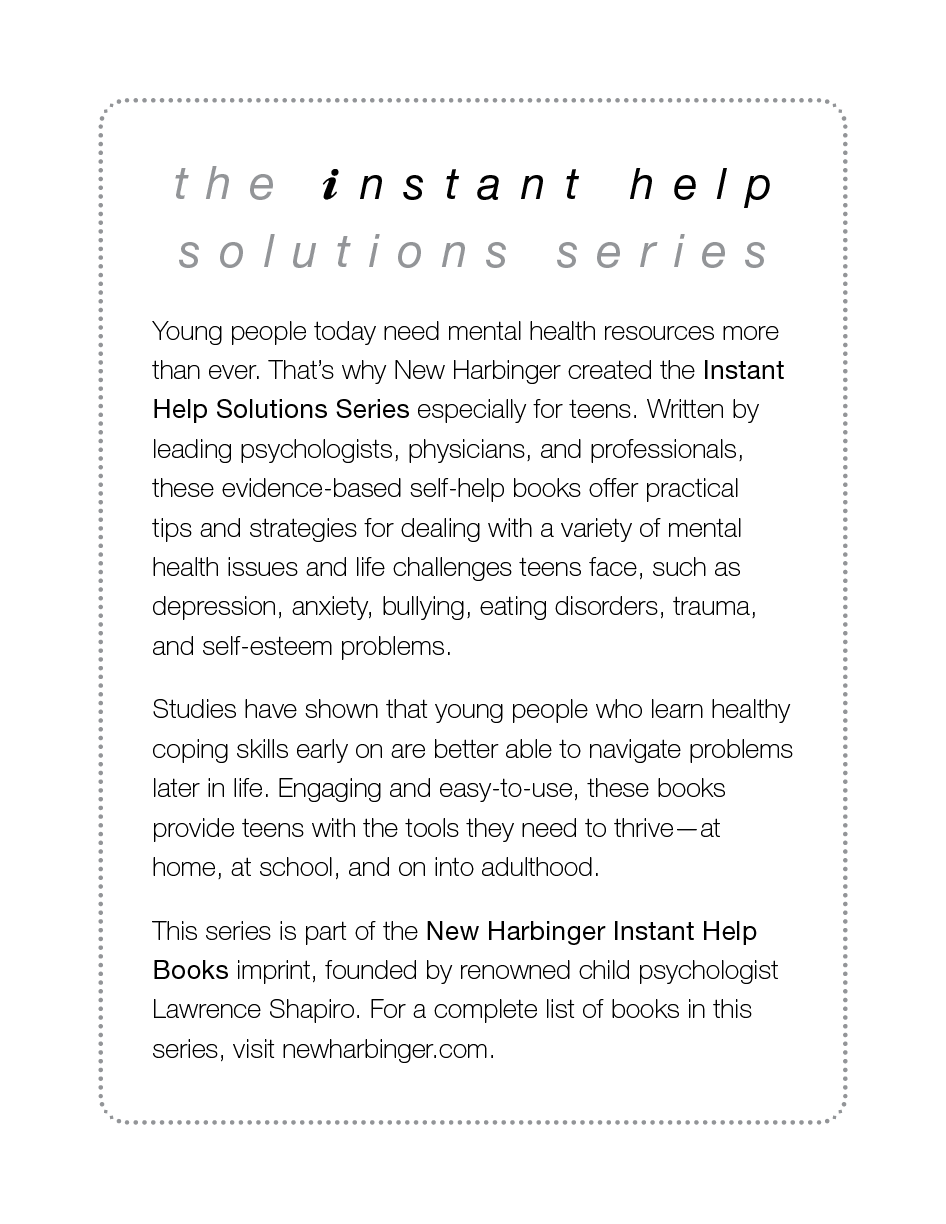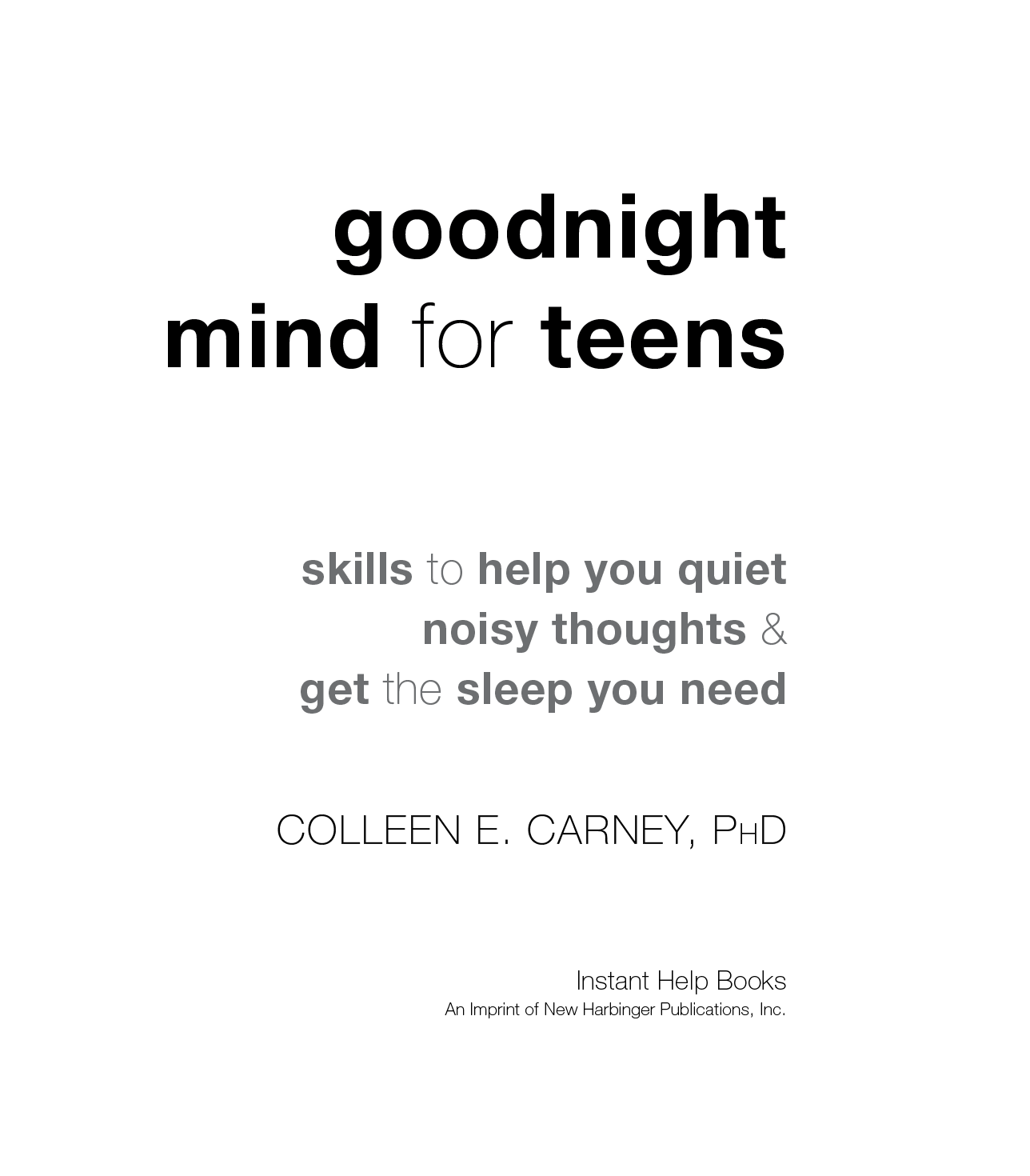Colleen Carney has taken the complex field of adolescent sleep and circadian science research, and crafted its most supported findings into an easy-to-read book filled with useful information that can be quickly learned and utilized to improve sleep health. The use of case studies, hands-on activities, and step-by-step instructions make this book an excellent resource for teens, parents, and providers to help address many of the sleep problems and related obstacles that are unique to todays teens.
Allison K. Wilkerson, PhD , licensed psychologist, and assistant professor at Medical University of South Carolina
Sleep affects everyone across the age range, but each age group has their own unique sleep difficulties. Colleen Carney has put together the ideal book for teens and their families, physicians, and support network to understand, identify, and address the idiosyncrasies of teen sleep. Many teens and their families can benefit from this book, which lays out a clear plan and offers evidence-based tips any teen can follow to improve their sleep.
Katherine Marczyk Organek, PhD , pediatric sleep psychologist at Cook Childrens Medical Center
Teens are sadly not exempt from sleep problems, and insomnia is an ever-growing issue in this population. Colleen Carneys book is a valuable resource for adolescents and their parents, helping all members at home achieve a better nights sleep. A practical, straightforward, and scientifically backed approach to targeting insomnia, Goodnight Mind for Teens will also be of great use to the vast majority of teachers, therapists, and pediatricians who work with this population. Good sleep habits should be taught early on, and Carneys book lays a fantastic groundwork for a lifetime of healthy sleep.
Shelby F. Harris, PsyD , author of The Womens Guide to Overcoming Insomnia , and clinical associate professor of neurology at the Albert Einstein College of Medicine
This engaging book is a must-read for teenagers who have difficulty sleeping. Problems with sleep during the teenage years are common, and can lead to difficulties with learning, attention, memory, and many other daytime consequences. Colleen Carney speaks directly to teens with her succinct writing style and clear approach to managing insomnia. The book includes education about sleep and evidence-based treatment suggestions, as well as clear summaries and plans for the week in every chapter. Teenagers, parents, and anyone who works with teens will benefit from reading this book, which will empower teens to improve their own sleep.
Shelly Weiss, MD, FRCPC , pediatric neurologist, professor, and faculty of medicine at the University of Toronto; author of Better Sleep for Your Baby and Child ; and past president of the Canadian Sleep Society
Publishers Note
This publication is designed to provide accurate and authoritative information in regard to the subject matter covered. It is sold with the understanding that the publisher is not engaged in rendering psychological, financial, legal, or other professional services. If expert assistance or counseling is needed, the services of a competent professional should be sought.
Distributed in Canada by Raincoast Books
Copyright 2020 by Colleen E. Carney
Instant Help Books
An imprint of New Harbinger Publications, Inc.
5674 Shattuck Avenue
Oakland, CA 94609
www.newharbinger.com
Cover design by Amy Shoup; Acquired by Jess OBrien; Edited by Ken Knabb
All Rights Reserved
Library of Congress Cataloging-in-Publication Data
Names: Carney, Colleen, author.
Title: Goodnight mind for teens : skills to help you quiet noisy thoughts and get the sleep you need / Colleen E. Carney.
Description: Oakland : Instant Help Books, an imprint of New Harbinger Publications, Inc., [2020] | Series: The instant help solutions series | Audience: Ages 14-18
Identifiers: LCCN 2019056571 (print) | LCCN 2019056572 (ebook) | ISBN 9781684034383 (paperback) | ISBN 9781684034390 (pdf) | ISBN 9781684034406 (epub)
Subjects: LCSH: Insomnia--Treatment. | Sleep disorders in adolescence--Treatment. | Affective disorders--Treatment. | Cognitive therapy.
Classification: LCC RC548 .C3644 2020 (print) | LCC RC548 (ebook) | DDC 616.8/498--dc23
LC record available at https://lccn.loc.gov/2019056571
LC ebook record available at https://lccn.loc.gov/2019056572
Contents
Using This Book
Unfortunately, many teens and young adults complain that they have sleep problems and that nothing seems to help. I noticed that much of what was available for teens was actually written for kids or for adults. But teens sleep problems are unique. So I decided to write a book that specifically addresses those problems.
- Do you have difficulty with not being able to fall asleep quickly?
- Do you wake up in the middle of the night and find it difficult to return to sleep quickly?
- Do you fall asleep during the day?
- Do you feel like you need to sleep for long periods on the weekends?
If you answered yes to any or all of these questions, there are things that you can do to feel better!
Help Is on the Way
If you are reading this book, you are probably one of the many teens struggling with sleep or with feeling tired. You are not alone. There are many reasons to want to sleep better, including feeling better and improving your health. I have designed this book so that the tips in the chapters correspond to the most common sleep-related problems faced by teens. The tips within each chapter are specific, tailored to your sleep information from a sleep tracking form you complete, and the goals you set to improve your sleep are entirely determined by you.
We have very effective treatments for insomnia for kids and adults. However, teens face unique sleep problems that limit their ability to use child-focused sleep resources. Treatments for children focus on parents strictly controlling bedtimes and wake times, but adolescence is a time when teens are supposed to be learning to be more independent. Treatments for adults do not focus on the body-clock problems created by sex hormones during puberty, or on the pattern of oversleeping on the weekends. Teens need their own treatment adapted from state-of-the-art sleep medicine research. This treatment is based on cognitive behavioral therapy (CBT) and it has been shown to be effective in young adults. CBT is an approach that assumes that changing your thoughts and behaviors can change the way you feel and can help with health-related problems. Of course, CBT may not be for everyone. Other options include medications that may be offered by your doctor. However, most experts agree that not enough is known about the safety and long-term effects of sleeping medications, and that CBT is usually a preferable frontline treatment. This means that CBT should be offered to teens first.
Most teens say they prefer to direct their own treatment. This is referred to as self-management. As a result, there has been a trend to provide CBT tools to teens, but in a way that allows you to choose what strategies to use and what goals to set. Self-management empowers you to set goals that you know you can achieve. Achieving success in your goals and experiencing the benefits makes you feel more confident to make further changes. Many teens say they are frustrated that they are told to follow a specific schedule that results in them lying awake unable to sleep, and then they are criticized when they are unable to get out of bed in the morning at the time they are supposed to get up. This creates a cycle of conflict between parents and teens, which can result in the teens feeling less motivated about making any changes. You can discover for yourself, with some guidance in this book, the optimal time to get out of and into bed. If you need to go to bed and get up earlier, you can use techniques to gradually shift toward an earlier time, and you can achieve this by setting realistic goals and moving slowly toward your eventual goal. Behavior change is more successful when it involves wins along the way. Setting an unrealistic goal that is not achievable is frustrating, and since it will be unsuccessful, it can lead to unhelpful self-criticism and equally unhelpful family arguments.

